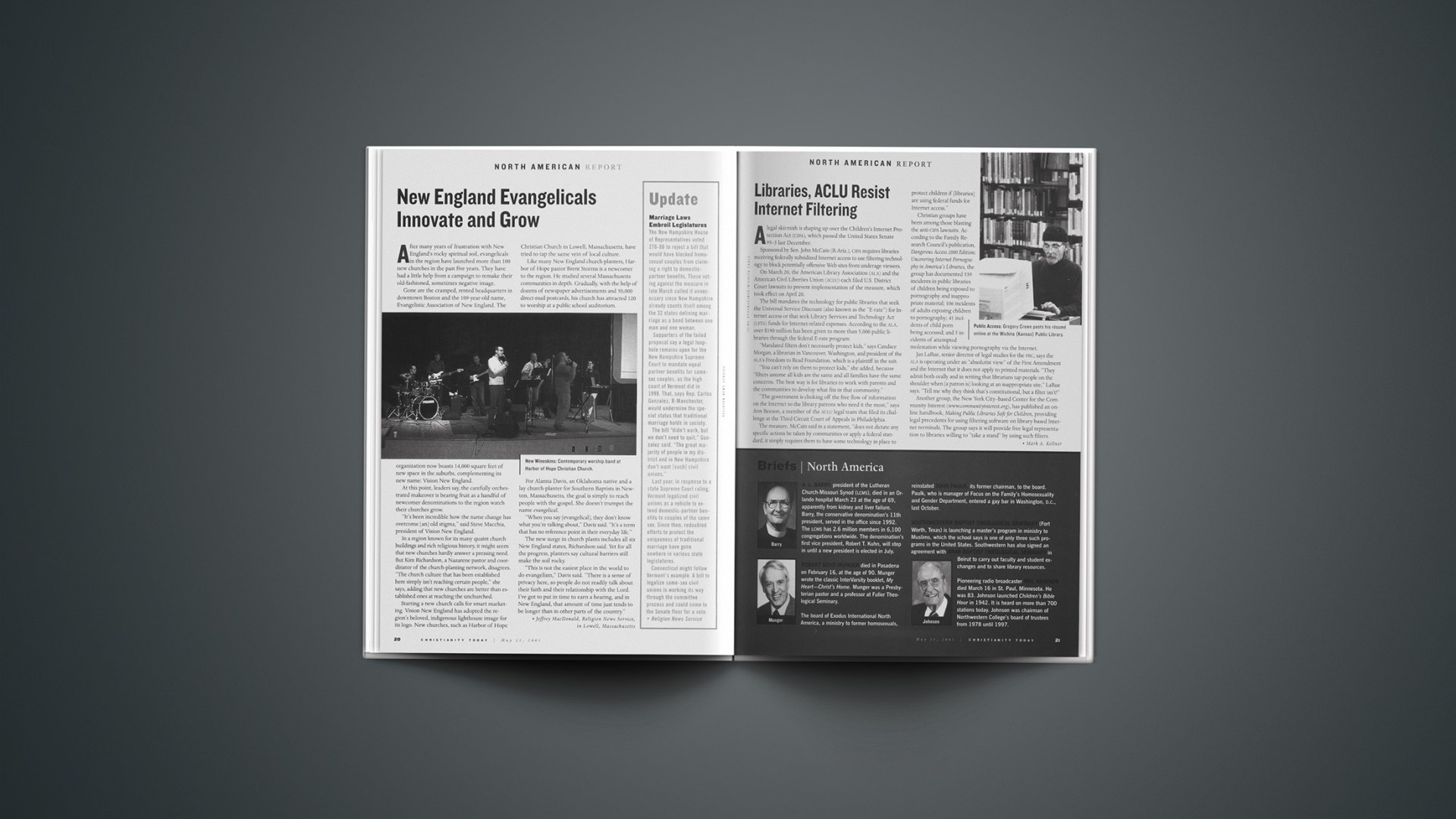On March 20, the American Library Association (ALA) and the American Civil Liberties Union (ACLU) each filed U.S. District Court lawsuits to prevent implementation of the measure, which takes effect on April 20.
The bill mandates the technology for public libraries that seek Universal Service discounts (also known as the “E-rate”) for Internet access or that seek Library Services and Technology Act (LSTA) funds for Internet-related expenses. According to the ALA, over $190 million has been given to more than 5,000 public libraries through the federal E-rate program.
“Mandated filters don’t necessarily protect kids,” said Candace Morgan, a librarian in Vancouver, Washington, and president of the ALA’s Freedom to Read Foundation, which is a plaintiff in the suit.
“You can’t rely on them to protect kids,” she added, because “filters assume all kids are the same and all families have the same concerns. The best way is for libraries to work with parents and the communities to develop what fits in that community.”
“The government is choking off the free flow of information on the Internet to the library patrons who need it the most,” said Ann Beeson, a member of the ACLU legal team that filed its challenge at the Third Circuit Court of Appeals in Philadelphia.
The measure, McCain said in a statement, “does not dictate any specific actions be taken by communities or apply a federal standard, it simply requires them to have some technology in place to protect children if [libraries] are using federal funds for Internet access.”
Christian groups have been among those blasting the anti-CIPA lawsuits. According to the Family Research Council’s publication, Dangerous Access 2000 Edition: Uncovering Internet Pornography in America’s Libraries, the group has documented 539 incidents in public libraries of children being exposed to pornography and inappropriate material; 106 incidents of adults exposing children to pornography; 41 incidents of child porn being accessed; and 5 incidents of attempted molestation while viewing pornography via the Internet.
Jan LaRue, senior director of legal studies for the FRC, said the ALA is operating under an “absolutist view” of the First Amendment and the Internet that it does not apply to printed materials. “They admit both orally and in writing that librarians tap people on the shoulder when [a patron is] looking at an inappropriate site,” LaRue said. “Tell me why they think that’s constitutional, but a filter isn’t?”
Another group, the New York City-based Center for the Community Interest, has published an online handbook, Making Public Libraries Safe for Children, providing legal precedents for using filtering software on library-based Internet terminals. The group says it will provide free legal representation to libraries willing to “take a stand” by using such filters.
Copyright © 2001 Christianity Today. Click for reprint information.
Related Elsewhere
In February, Christianity Today editorialized on the law: “Good Idea, Fallible Filters | Why even free-speechers liked the Children’s Internet Protection Act. (Feb. 20, 2001)Previous Christianity Today stories about filter laws include:
Internet Pornography Use Common in many Libraries, Report Says | Librarian-researcher claims American Library Association thwarted study (March 20, 2000)
Child Online Protection Act Challenged | (Dec. 17, 1998)
Christian Leaders Target Cyberporn | (Jan. 6, 1997)
The Children’s Internet Protection Act (of 2000) should not be confused with the Children’s Online Protection Act (of 1998), which required the distributors of objectionable material to restrict minors’ access to such material over the Web.
A 1997 study by the Electronic Privacy Information Center (EPIC) found that some Internet filters mistakenly registered 98 percent of the information at sites like the American Red Cross, the United Way and the NAACP as “objectionable.”
Last year a library in Michigan rejected the use of filters for adults, saying filters severely limited the search capabilities of users. Read the Associated Press story here.
Other news articles and opinion pieces on the Children’s Internet Protection Act include:
FCC Issues Rules for Filtering Access to Internet Sites — Education Week (Apr. 18, 2001)
Don’t Rely On Porn Filters — Editorial, The Hartford Courant (Apr. 11, 2001)
U.S. Ties Web Filters to Cash for Schools, Libraries — NewsFactor.com (Apr. 9, 2001)
Libraries join battle on ‘Net censorship — The Cincinnati Post (Apr. 6, 2001)
Kid Porn Act Gets Buffed Up — Wired News (Apr. 4, 2001)
A battle to block the filters — The Hartford Courant (Apr. 1, 2001)
Filters don’t censor, they protect our kids | Foes of Internet filter law don’t understand the dangers of online porn — Donna Rice Hughes, MSNBC (May 27, 2001)
In the name of the children | Anti-porn crusaders hide behind our kids — Brock N. Meeks, MSNBC (May 27, 2001)
Keep censors out of libraries | When Internet filters replace human guidance, trouble ensues — Judith Krug, MSNBC (May 27, 2001)
A legal challenge bound to fail | Why an Internet filter law will withstand liberal assaults — Jay Sekulow, MSNBC (May 27, 2001)
Library association plans suit over filtering — IDG/CNN (Jan. 19, 2001)
Filtering software raises ire — The Seattle Times (Jan. 15, 2001)
Internet blocking for blockheads — Steve Chapman, Chicago Tribune (Jan. 1, 2001)
Congress quietly censors the Web — Editorial, Chicago Tribune (Dec. 23, 2000)
Filtering Law Sparks Fight | ACLU Opposes Mandatory Software Filters in Libraries — Associated Press/ABCNews.com (Dec. 20, 2000)
ACLJ Promises Legal Defense for New Federal Law Requiring Public Libraries to Use Porn-Blocking Software — Press Release (Dec. 20, 2000)
Congress passes Net filtering bill — AP/USA Today (Dec. 19, 2000)










